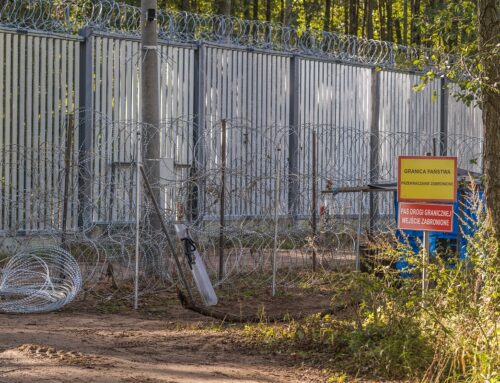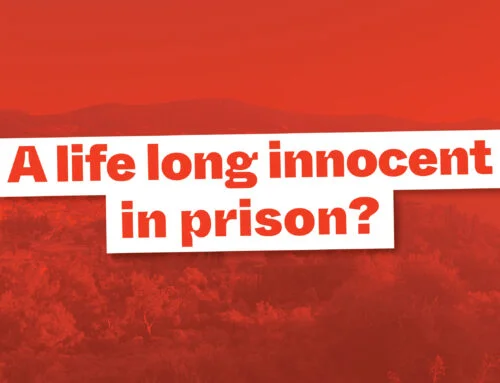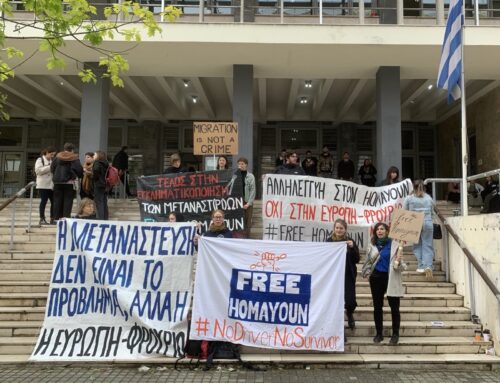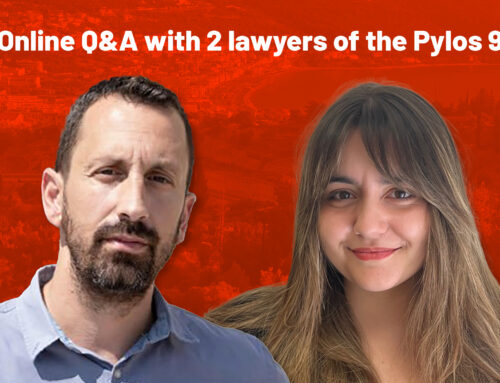Forced food insecurity at the Lesvos Closed Controlled Access Centre
June 15, 2023
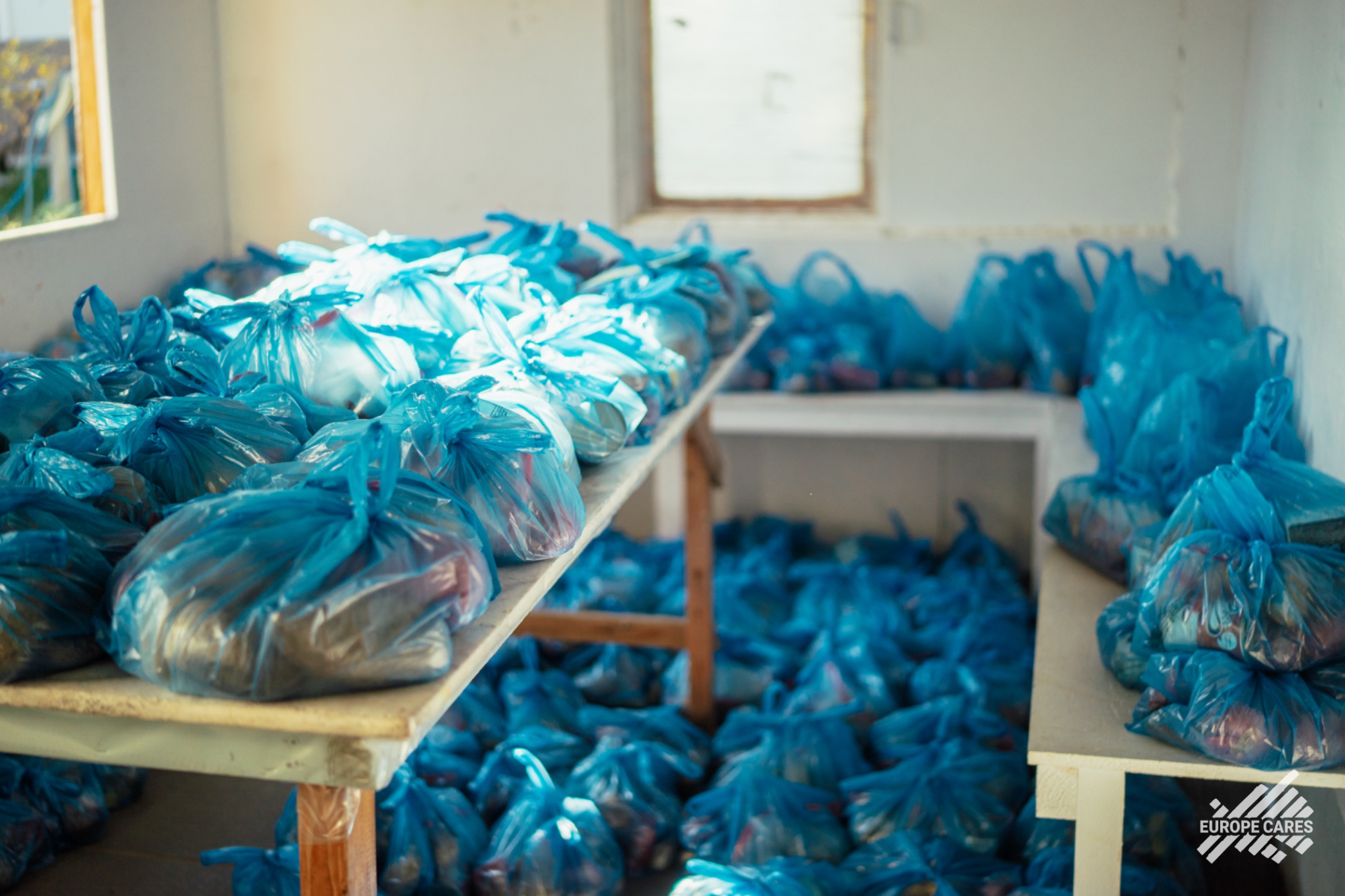
Food Distribution on Lesvos, Source: EuropeCares
TO:
- Mr Daniel Esdras, Minister of Migration and Asylum;
- Mr Emmanuel Logothetis, Special Secretary-General for the Reception of Asylum Seekers;
- Ms Patrina Paparrigopoulou, Minister of Labour and Social Affairs;
- Ms Ylva Johansson, EU Commissioner for Home Affairs;
- Ms Beate Gminder, Deputy Director-General of the European Commission (Task Force Migration Management).
CC:
- Mr Michael Fakhri, UN Special Rapporteur on the right to food;
- Mr Felipe González Morales, UN Special Rapporteur on the human rights of migrants.
On the 17th of May, Greek authorities announced that starting the next day food and water would no longer be provided for people outside of the asylum procedure living in the Lesvos Closed Controlled Access Centre (C.C.A.C.). Approximately 300 people staying in the C.C.A.C. are considered to be outside of the asylum procedure (excluding 200 similarly-situated children). Without warning or proper planning, these people are at immediate risk of food insecurity.
The Greek Ministry of Migration and Asylum maintains that under asylum and migration law only people applying for international protection are eligible for material reception conditions, including food and water. As nongovernmental (human rights) organisations working with people on the move, we want to emphasise that human dignity, and access to food and water, irrespective of legal status, are fundamental human rights. Greek authorities still have an obligation to facilitate access to food and water especially when people are unable to access it themselves.
Recognised refugees – The vast majority of those in the C.C.A.C. who have been granted international protection have no way to sustain themselves outside the centre. Recognised refugees are cut off from cash assistance immediately after they are granted international protection, and according to legislation have to leave reception centres within 30 days. Recognised refugees, in theory, should receive support to integrate into the community and have access to certain social benefits. In practice, bureaucratic obstacles, such as lack of access to residence permits, travel documents, and temporary social security numbers, make access to support extremely difficult – especially within a 30-day window.
Rejected asylum seekers – Another category of people being denied provision of food and water are asylum seekers whose applications have received final rejections. This group includes those whose asylum applications were rejected, solely on admissibility grounds due to Greece’s consideration of Türkiye as a safe third country. Due to difficulties with returns and the fact that Türkiye has not accepted any readmissions since March 2020, these people are left in legal limbo, lacking access to legal status, rights, and basic services in Greece.
People with vulnerabilities and children – No exemptions have been communicated for people with vulnerabilities, including pregnant or lactating women, people with disabilities and older people, who may be more susceptible to rights violations. Some of these groups also should receive additional protection of their right to food under international human rights treaties and standards. Authorities have indicated that all children under 18, regardless of status, will continue to receive food but their adult caretakers will not. Moreover, children under 18 might still be denied food if they have been subjected to an incorrect age assessment.
Since the enforcement of these policies was announced, civil society groups have attempted to fill the gap left by Greek authorities by providing affected individuals with food and water. However, nongovernmental groups’ limited resources mean they can provide only a temporary solution. Moreover, Greek NGO legislation poses an additional obstacle to the provision of services by NGOs to people outside of the procedure especially those located at C.C.A.C’s.
Unfortunately, this is not the first time large numbers of people face food insecurity. In October 2021, almost 60 percent of the residents of reception facilities on Greece’s mainland had lost access to sufficient food and water, causing severe distress and putting at-risk groups at even greater risk. Since then, civil society organisations have repeatedly raised the alarm about food insecurity among refugees and asylum seekers in mainland Greece. Yet, once again, Greek authorities are leveraging food insecurity to force people to leave the C.C.A.C. and Lesvos.
By letter dated 7 December 2021, EU Commissioner for Home Affairs, Ylva Johannson flagged that the “EU Commission has repeatedly called upon the Greek authorities to ensure that all persons, particularly the vulnerable, receive basic means of subsistence, notably food [.]” In order to ensure human dignity and basic rights, including the right to food and water, 42 organisations call on the Greek authorities and European Commission to immediately:
- Ensure that everyone living in reception facilities, including the C.C.A.C. of Lesvos, have access to adequate food and water, independently and irrespective of their legal status – until a careful assessment has been carried out to see if affected groups have sufficient means to guarantee subsistence and health.
- Guarantee that specific arrangements are in place to protect people with vulnerabilities and children outside of the asylum procedure from food insecurity.
- Reassess and extend the time recognised refugees are allowed to both stay inside reception facilities, including C.C.A.C.s, and to access material reception conditions so they have reasonable time to access integration support, find adequate housing and employment and increase the chances of self-sufficiency.
- Recognise that food insecurity is directly connected to housing insecurity, inability to access social support and ineffective integration support.
Signed by:
- Ariadni Lesvos
- Better Days Greece
- Boat Refugee Foundation
- Border Violence Monitoring Network
- Borderline Lesvos
- Changemakers Lab
- Choose Love
- Coexistence & Communication in the Aegean – Συνύπαρξη & Επικοινωνία στο Αιγαίο
- Defence for Children International Greece
- Doctors Without Borders – Greek Section – Γιατροί χωρίς Σύνορα – Ελληνικό Τμήμα
- Drapen I Havet – Σταγόνα
- Dutch Council for Refugees
- Equal Rights Beyond Borders
- Europe Cares
- Fenix Humanitarian Legal Aid
- Germany Must Act
- Greek Council for Refugees (GCR)
- Greek Forum of Migrants
- HIAS Greece
- Hoffnung leben
- Human Rights Watch
- I Have Rights
- Inter Alia
- Just Action
- Lean on us e.V.
- Legal Centre Lesvos
- Lesol
- Lesvos Solidarity
- Lighthouse Relief
- Makerspace Lesvos
- Medical Volunteers International e.V.
- Mobile Info Team
- Network for Children’s Rights
- Project Armonia
- ReFOCUS Media Labs
- Refugee Legal Support
- Refugee Support Aegean (RSA)
- Starfish Foundation
- Stichting Vluchteling
- Symbiosis – Council of Europe School of Political Studies in Greece
- Yoga and Sport with Refugees
- #LeaveNoOneBehind
Related News
We become active where states fail to act. But only with your support!
With our work we put pressure on German politics to take responsibility and finally change something! Your donations will be used for the #LeaveNoOneBehind campaign: For our own projects, as well as for funded projects and organizations that provide urgently needed support at the EU’s external borders and refugee routes.

